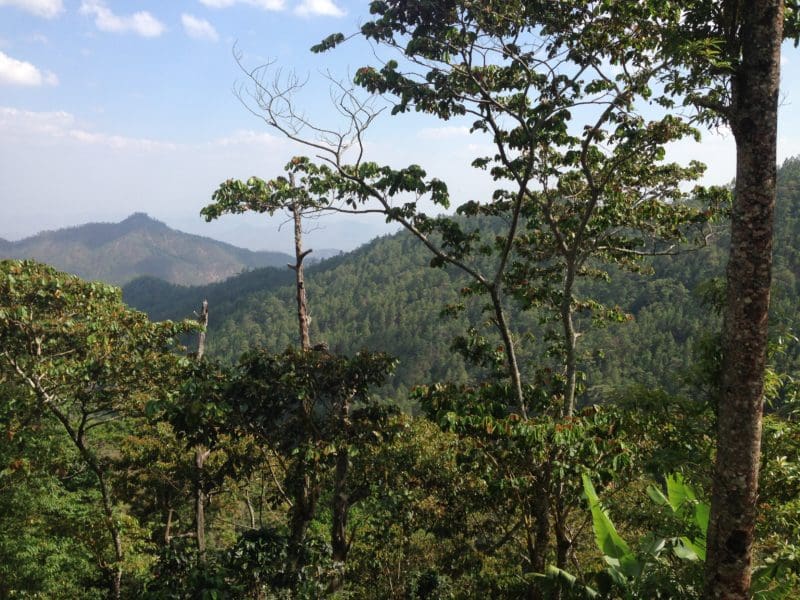The holidays are upon us; it is time to source holiday coffees! Seasonal blends can encompass a range of flavor profiles but often lean toward rich and comforting, perhaps savory, with hints of fruit and spice. Here are our favorite coffees to help build a sweet and balanced blend or micro-lot worthy of gifting and celebration.
Honey and Washed Coffees from Santa Elena Estate, Costa Rica
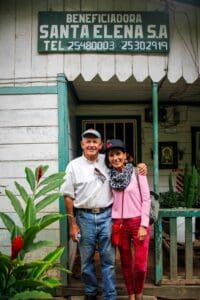
Luzma with her husband Jim in front of the Beneficio Santa Elena office.
Our friend Luz Marina (Luzma) Trujillo produces one of the finest coffees available on her estate Santa Elena in the highlands of Costa Rica's most famous coffee-growing region, Tarrazú. Luzma's coffee is grown under shade, and the perfectly ripe cherries are hand-picked and sorted for quality at her mill. The cherries are then carefully de-pulped, washed, and dried slowly on the patios at Finca Santa Elena to fully develop acidity and depth of flavor. Additional care is given to her coffee in the “reposo” stage, resting in parchment for at least 30 days after drying before being milled and shipped to Atlas.
Like many of our favorite growers, Luz Marina takes a holistic approach to sustainability, minimizing synthetic inputs and utilizing a closed-loop fertilizing system that composts discarded coffee pulp using red-wiggler worms. Her water treatment system meets the Costa Rican government’s high environmental standards and preserves the river’s cleanliness that flows through the estate. She offers her seasonal employees outstanding housing, health care, and a state-of-the-art drinking water filtration system.
Tarrazú coffee is known for being crisp and bright, and Luz Marina’s coffee offers that classic profile, a lightly syrupy body, sweetness, and an elegant finish. While both her Washed and Honey coffees have notes of chocolate and nuts this season, the Honey coffee is fruitier with notes of apple and brighter acidity. The Santa Elena coffees will form an excellent base for a holiday blend.
Pacamara Natural from Finca El Manzano, El Salvador
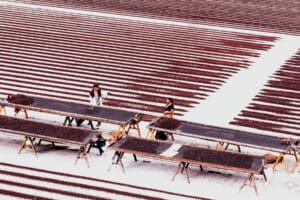
El Manzano processors drying and sorting cherry.
Finca El Manzano, founded in 1872, is located in Santa Ana at 1,300-1,500 masl and has belonged to Emilio López Díaz’s family for generations. In 2005, he expanded the operation by replanting new varieties on the farm and by building Beneficio El Manzano.
The new cultivars and production facility allowed Emilio to experiment with different processes and explore the various characteristics of the other varietals. These varietals include Yellow, Red, and Orange Bourbon, Pacamara, SL-34, Gesha, Pacas, and Caturra.
At the heart of the farm, you’ll also find a state-of-the-art mill, where their coffees can undergo various processes such as patio, raised bed, mechanical drying, and natural, honey, and washed processing methods.
This degree of cultivation and control of the process has been at the forefront of what makes Finca El Manzano so remarkable. Coffee from this farm has contributed to three national barista championships and first and second-place finishes in the 2018 El Salvador COE.
Emilio is a long-term partner of Atlas. Fun fact: Trader Dana Foster worked in Quality Control and Commercial Sales for Emilio's company in El Salvador. We met Dana at El Manzano on our annual visit, and when she was ready to move back to the States, she joined our team in Seattle! This season, we're offering their beautiful Pacamara Natural, which just became available at The Green Room. With notes of apple, chocolate, and toffee sweetness, this delicious coffee will make a crowd-pleasing standalone feature or an excellent base for a blend.
Fair Trade Organic CODECH, Huehuetenango, Guatemala
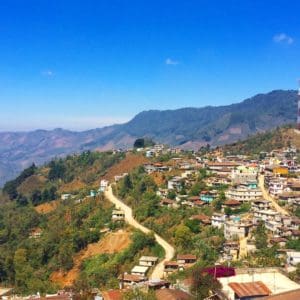
Community of Concepción Huista, home of CODECH
Tucked in the Sierra de Los Cuchumatanes, the highest mountain range in Central America, the Coordinadora de Organizaciones de Desarrollo de Concepcion Huista, or "CODECH," produces some of the best Fair Trade & Organic coffees not just in the department of Huehuetenango, but in all of Guatemala. CODECH is comprised of three base cooperatives: Asociación de Desarrollo Integral Productivo Yamanonh (ADIPY), Asociación de Desarrollo Integral Tierra Hermosa Concepcionera (ADINTHEC), and Asociación de Agricultores Tineco (ADAT) – and its members represent the Popti, Mam, and Q'anjob'al branches of the Mayan family.
After our first visit in late 2009, CODECH started a micro-lot program by classifying producers according to their farms' elevations. Since 2012, we've assisted in organizing an internal cupping competition for single producers that now is an annual event.
The micro-lots often exhibit the classic Huehue blackberry and chocolate flavors but can also be refined with elegant acidity and notes of stone fruits and citrus. Several Fair Trade Organic community and single-producer micro-lots land at the beginning of November, just in time for launching seasonal coffees. Whether you want comfort or adventure, CODECH is on point as a base for your wintery blends.
Washed and Natural Family Lots from Vides 58, Huehuetenango, Guatemala
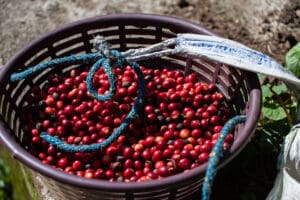
Freshly picked cherry at a Vides farm.
Vides 58 is a family company with six farms based in Huehuetenango, Guatemala, and a state-of-the-art cupping lab in Guatemala City. Nayo, these farms' current manager and promotor, has dedicated his time to variety diversification, improved quality, and equipment advancement. He works alongside an incredible team of dedicated and motivated professionals, including his wife, Jaqueline, a Q Grader who spends much of her time in their stunning lab in Guatemala City. The Vides 58 approach to business is one of outstanding professionalism, focused on cultivating long-term mutually beneficial relationships. The entire team radiates kindness and has the unique ability to put those around them immediately at ease.
Two delicious micro-lots land at the beginning of November:
- Cuevitas, 20 bags: raisin, plum, orange, and caramel sweetness, satiny body, and bright acidity
- Natural El Panal, 61 bags: cacao, prune, black grape, blackberry, raisin, and nutty, juicy acidity, and silky body
Washed AB Microlots from Kenya
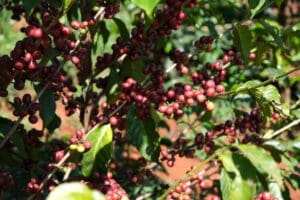
A coffee plant ready for harvest in Kenya.
Traceable Kenya coffees are available from either privately owned estates or cooperatively managed washing stations commonly called "Factories." Factories are typically organized in Societies, much like cooperatives organized under associations in Latin American coffee-producing countries. While private estates could market directly to buyers for some time, it's a relatively recent development that exporters have been able to sell coffees from individual washing stations (factories) directly to buyers. As a result, Atlas' buying is currently focused on just a few Farmer Cooperative Societies (FCS.)
The quality of Kenya coffee is considered among the highest in specialty coffee circles. The sweetness, complexity, and bold acidity are practically unmatched by any coffee-growing region. Fruit notes range from citrus (grapefruit, mandarin orange) to stone fruit (peach, apricot) to dark berry (blackberry, black currant) and everything in between. The diversity of Kenya's coffee profiles is part of the origin's charm. We source various styles to showcase Kenya's best coffees.
We have three micro-lots available from The Green Room at the end of September, and these beautiful coffees are sure to sparkle for the holiday season.
- AB Thiriku FCS, 11 bags: apricot, apple, grapefruit, and vanilla sweetness, black tea, silky body, and bright, citric acidity
- AB Barikongo FCS, 23 bags: prune, raisin, date, Thai iced tea, and coconut, full and satiny body and bright, grape-like acidity
- AB Rungeto Karimikui FCS, 22 bags: plum, black cherry, and date sugar sweetness, lemon peel, round body, and plum-like acidity
Natural Community Lots from Kyauk Ku Pyin, Myanmar
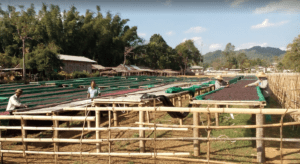
Several groups we work with are at the forefront of Myanmar’s specialty coffee movement, including the Mandalay Coffee Group (MCG) (a wet and dry mill, export company, and consortium of 50 estates in Mandalay), Amayar (a wet and dry mill and exporter in Ywangan owned and operated by Daw Su Su Aung), Shwe Taung Thu (a consortium of 17 villages in Ywangan who produce naturals almost exclusively), and Behind the Leaf (a wet and dry mill and exporter in Pinlaung).
Even after the coup in February 2021 and the reality of ongoing logistical, market-access, and climate-based challenges, our partners continue to produce and process specialty coffee with the highest standards and professionalism.
Micro-lots from Amayar and Shwe Taung Thu member communities became available in mid-October at the Annex. They will be transferred as needed to The Green Room, and their quality is remarkable. Only one lot remains available, our perennial favorite from the Kyauk Ku Pyin community. With flavors of plum and raisin, caramel sweetness, melon-like finish, satiny body, and bright, plum-like acidity, this clean natural from Kyauk Ku Pyin will make an exceptional Single Origin or fruity component to a celebratory blend.
Washed FTO Coffee from the PRODECOOP in Nicaragua
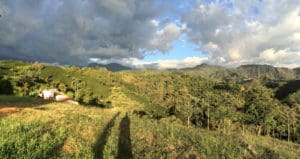
Photo of the landscape during golden hour from a visit by Chis Davidson.
Promotora de Desarollo Cooperativa de las Segovias (PRODECOOP) is a secondary cooperative comprising 38 base coops and over 2,700 individual producers. Of these, 27% are women, around 50% are certified organic, and 100% are certified fair trade. Most of PRODECOOP’s members are located in three coffee-producing departments in the north of Nicaragua: Estelí, Madriz, and Nueva Segovia. Depending on the area, the growing altitude can range from 1,200 to 1,500 masl, and most farmers work with the Caturra and Bourbon varieties.
PRODECOOP stands out for its holistic and altruistic commitment to its members’ well-being. Their core values include gender and generational equity, climate change adaptation, food security, and a democratic leadership structure. In their vision is the motto “Work based in the family and for the family.” Quality of product, service, and environment plus social development equals quality of life for the families.
Coffee quality from PRODECOOP is extremely consistent, mainly due to its farmer education programs, the coop’s skilled quality assurance staff, and its state-of-the-art dry mill. Dark chocolate, cranberry, and walnut are often used to describe PRODECOOP’s lots, and lively acidity and brisk aftertaste highlight the painstaking effort taken by the farmers during their washing. PRODECOOP’s SHG EPs are incredibly versatile and certified blend components. In September, we received a new lot with notes of apple, toffee, almond, and citrus, medium body, and citric-like acidity. Use PRODECOOP as a classic base for your winter blends!
Single-Producer Nano-lots from Beneficio Las Segovias, Nicaragua
Are you looking for something just a little off the beaten path? Then, one of these micro-lots may be for you! We have a few Natural nano-lots (3-4 bags) from producer and master processor Luis Alberto Ballardez's Finca La Bendicion and from producers Mario Vilchez and Mario Gonzales through Bridazul.
Visiting Luis Alberto's Beneficio Las Segovias (BLS) feels a little like entering a sanctuary for coffee, and Luis Alberto exudes a calming and impressive confidence. The cupping room, drying patios, and dry mill at BLS are immaculate and maintained with care. Quality control is revered here, and every picking that Luis Alberto receives at his wet mills and dry mill is carefully cataloged and tracked through the entire process.
The available lots feature juicy fruit notes, chocolate and cinnamon undertones, and the pronounced sweetness and viscosity one might expect from various natural processes. These coffees shine on their own as single origins and balance well with coffees with more base notes, bringing a little joy to everyone who tries them.
- La Bendicion Retencion Pacamara Natural, 3 bags: raisin, grape, apple, and maple sweetness, lemon, full body, and grape-like acidity
- La Bendicion Bambú Pacamara Natural, 3 bags: mango, peach, strawberry, and orange sweetness, sugar browning sweetness, satiny body and bright acidity
- Bridazul - Los Suyates, Mario Gonzalez, Natural, 4 bags: plum, raspberry, guava, and peach sweetness, wine-like finish, round body, and juicy acidity
- Mario Vilchez, Natural Caturra, 4 bags: apple, cherry, chocolate, black tea, and toffee sweetness
